Northern Cape High Court allows rhino horn export for conservation funding

Rhino conservationist Wicus Diedericks received the judicial greenlight to export rhino horns to fund conservation efforts.
Image: File
In a landmark ruling, the Northern Cape High Court in Kimberley issued a judgment that allows rhino horn harvested from registered captive breeding operations to be exported under specific permits for conservation purposes.
Wicus Diedericks, who operates a private rhino conservancy, turned to court after he wanted to export some horns of living rhinos to fund ongoing conservancy efforts, which run into about R20 million annually.
The government, however, refused to issue him the relevant permits.
Diedericks describes his conservancy as breeding rhinos to help ensure the survival of the species and play a part in the prevention of its extinction.
His property spans 33,000 hectares, but its location is not mentioned due to the dangers of rhino poaching.
Diedericks told the court that he has operated this rhino conservancy at great personal cost for more than 10 years.
He needed to protect these animals from poaching by harvesting and then selling the horns of living animals, which were born in captivity, in a sustainable manner that is not harmful to any living animal.
He does not want to make commercial profit, and the proceeds of the sales will be ploughed back into the conservation of the rhino.
Diedericks argued that the existing international treaty, being the Convention on the International Trade in Endangered Species of Wild Fauna and Flora (CITES), as it was adopted by South Africa and the way it was incorporated into our domestic law, already makes provision for such trade.
This is, however, disputed by the ministers of Agriculture, Environmental Affairs, and Forestry, Fisheries and the Environment.
Diedericks applied for a number of permits to export the horns of the white rhinos. When the government failed to deal with these applications, he obtained an earlier order compelling the Environmental Affairs MEC to make a decision.
The MEC, however, refused the relevant permits on her interpretation of CITES, which she said prohibited the export of rhino horns. Diedericks subsequently turned to the court to have this decision overturned.
He asked the court to declare that the exemption contained in Article VII(5) of CITES is part of South African domestic law.
Diedericks argued that in circumstances where the management authority is satisfied that the rhino horn comes from a white rhino that was bred in captivity for conservation purposes, it should issue the relevant permit for the export of the horns.
Judge Lawrence Lever remarked that it seems that all the parties agree that the central issue in this case is whether Article VII of CITES has been incorporated into South African domestic law.
He noted that CITES is a specific multilateral treaty dealing with environmental law that seeks to regulate international trade in endangered species.
He pointed out that it does not, as a blanket provision, prohibit international trade in endangered species, but it classifies how endangered they are perceived to be.
An important distinction is made in CITES between wild animals and animals bred in captivity. Trade in wild animals can only take place if the conditions stipulated in Article III of CITES are complied with.
However, if animals listed in Appendix I are bred in captivity for commercial purposes, then Article VII provides that such animals may be traded under the less onerous conditions.
Judge Lever commented that Diedericks has run his conservancy for a decade, and it is clearly aimed at conservation. It is clearly a captive breeding operation and not run for commercial purposes, he said.
The judge concluded that Diedericks is thus entitled to the exemption provided for in CITES and that he should be given the permits allowing him to export these horns.
zelda.venter@inl.co.za
Related Topics: